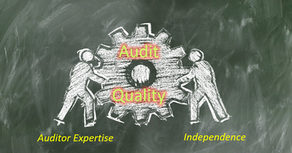The Clarity Project

The International Accounting Standards Board (IAASB) initiated a campaign in 2004 to improve the clarity (readability) of the ISAs. This Clarity Project’s overarching objective was to make the ISAs more understandable, which would, in turn, make it easier to apply the standards consistently and lead to an improvement in the overall audit quality on a […]
The ISAs that affected by the Clarity Project

Continued from the previous post: The Clarity Project [https://lnkd.in/giptfb7k] ISA 260 Communication with Those Charged with Governance This clarified ISA emphasises the importance of effective two-way communication between the auditor and those charged with governance of the entity. Where the auditor encounters significant difficulty during the course of an audit, the auditor is required to […]
What Function Does the International Auditing and Assurance Standards Board(IAASB)Play?

The International Auditing and Assurance Standards Board, also known as the IAASB, is responsible for setting the International Standards on Auditing (ISAs). It is an independent body that sets international standards of high quality on aspects of: The International Auditing and Assurance Standards Board were established in March 1978. Before that, it was known as […]
Improving Audit Quality 2: What is Audit Quality?

Sadly, there is no one agreed-upon definition of what constitutes a quality audit. The Center for Audit Quality (CAQ) identifies the following as the two primary pillars around which audit quality is built: (*) Independence refers to external auditors’ interests being independent of those of company management Several elements determine the quality of an audit; […]
Improving Audit Quality 1: An Overview

Back to N Years Ago When I was younger (wow, this makes me feel so old), audit quality was not really a “thing.” I watched my superiors perform audits they believed to be sufficient, and my colleagues and I were taught to follow in their footsteps. We conducted what we believed to be good audits […]
6. Is Professional Scepticism necessary in other Audit areas besides Fraud?

Throughout the auditing process, Professional Scepticism is vital. 在整个审计过程中,职业怀疑态度是至关重要的。 Professional Scepticism is especially crucial when handling complicated, significant, or highly judgmental audit areas, such as: Accounting Estimates, Including Fair Value Accounting Estimates, and Related Disclosures – For example, when: 在处理复杂、重大或高度判断性的审计领域时,职业怀疑态度尤为关键,例如: 会计估计,包括公允价值会计估计,以及相关的披露 — 例如,当 Going Concern For example, In examining management’s plans for future actions concerning […]
Proposed International Standard on Auditing for Audits of Financial Statements of LCE

Proposed International Standard on Auditing for Audits of Financial Statements of Less Complex Entities (ISA for LCE) – PDF 4
IAASB / IFAC Quality Management Webinar Series

4
IAASB raises the Bar for Quality Management – All You Need to Know About the Firm’s Risk Assessment

1) This is a critical time for professional accountants in public practice. Many standards are evolving, with none perhaps more important than the suite of new and revised quality management standards approved by the IAASB. 2) Three (3) new quality management standards, namely: will be effective from 15 December 2022. 3) The standards, aim to […]

